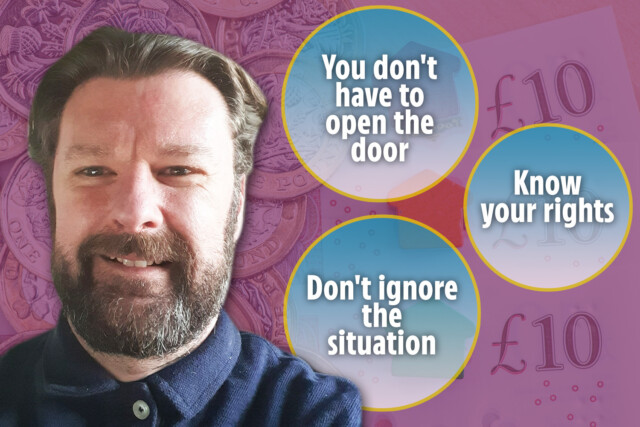HAVING bailiffs turn up at your door can be a daunting prospect, especially if you don’t know what you should do.
But homeowners do have rights if debt collectors come knocking.
Debt expert Jonathan Chesterman has offered his top tips for dealing with bailiffs
Bailiffs may turn up at your door if you’ve not paid debts, such as Council Tax bills, parking fines, court fines and county court, high court or family court judgements.
They might come to your home to serve court documents, or give notices or a court summons as well.
There are different types, including “certified enforcement agents”, “high court enforcement officers” and “county court and family court bailiffs”.
According to The Guardian, at least 280,000 households were referred by local authorities to bailiffs over council tax debt during the first year of the coronavirus pandemic.
But what are you supposed to do if they arrive on your front door step?
HOAR spoke to Jonathan Chesterman, debt advice policy manager at charity StepChange, who offered his four top tips if you’re dealing with a bailiff.
Don’t ignore the situation
Jonathan said his number one tip was to deal with the situation at hand.
“A letter or a visit from a bailiff is a sign that you need debt help,” he said.
“If you’ve got to the stage of bailiffs getting involved, things will only get worse if you ignore it.
“It’s never too late to get in touch with your creditor and offer a payment you can manage.”
You don’t have to open your door
Just because a bailiff is at the door, you’re not legally obliged to open it.
You can speak to them through the letterbox or from an upstairs window.
Plus, you can even ask them to return to their vehicle and speak to them from there.
Jonathan said: “There are some situations where it can be best to let the bailiff in, but you must think very carefully before doing this, and we strongly recommend you don’t open the door to them unless you’ve had expert debt advice.
“Always ask to see proof of ID and a copy of the warrant or writ.
“The bailiff can hold these up to a window or show you through the letterbox.”
However, one thing to note is that if a bailiff is arriving at your home to collect a criminal debt, they CAN use force to enter.
You can hide goods
If you know a bailiff is going to turn up at your door, you can hide goods in your house so they don’t list them to be taken away.
But, you should not do this after one visits, as once the bailiff has visited and listed the items they want to take away, hiding them away is as criminal offence.
Jonathan added: “Cars are an easy target for bailiffs – they’re hard to hide and easy to sell.
“If they know you have a car, bailiffs will look hard for it, so park well away from your home, preferably in a locked garage.”
Be in the know about paperwork
A bailiff can only visit you after they’ve sent you a letter to let you know they’ll be coming.
This letter is called a “notice of enforcement” and should be received seven clear days before the visit.
This allows you time to clear the debt in full or come to an arrangement to repay it in instalments.
If you do make a debt repayment, Jonathan said you should always keep the receipt.
And if a bailiff has made a list of your goods and asks you to sign a controlled goods agreement, used to secure a debtor’s goods, you should sign it.
He said: “If you don’t sign it, they’re much more likely to take your goods straight away.”
He added: “If you sign a controlled goods agreement, make sure the payments you’re agreeing to make are realistic.
“If you miss payments because you can’t afford them, the bailiff may take your goods away.”
If you’re struggling to pay debt, there are a number of services you can use to get free advice and help, including:
- Money Helper – 0800 138 7777
- Citizens Advice – 0808 800 9060
- StepChange – 0800 138 1111
- National Debtline – 0808 808 4000
Did you miss our previous article…
https://hellofaread.com/money/tsb-down-leaving-hundreds-of-customers-unable-to-access-online-banking/








